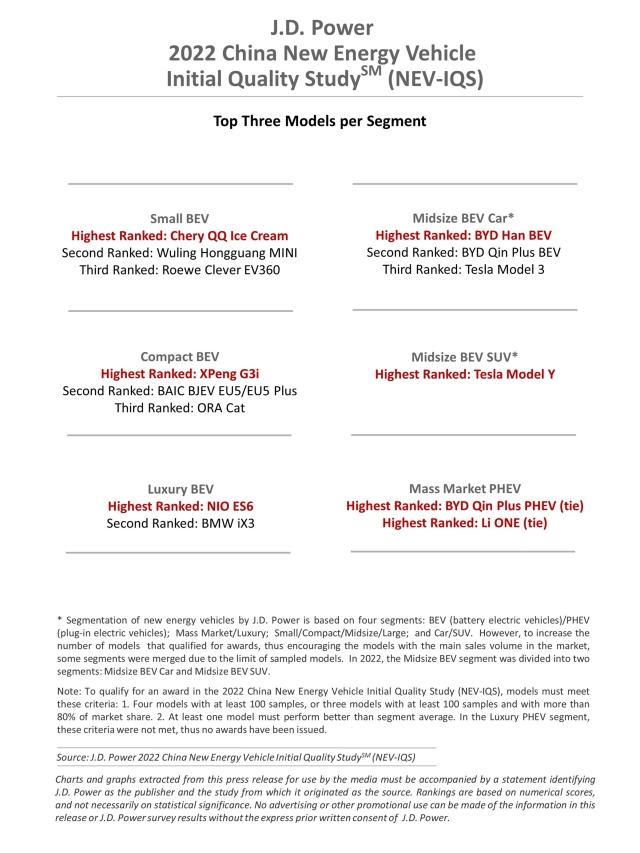Quality of New Energy Vehicles (NEVs) Made by China Startups Maintains Leading Edge, JD Power Finds
Chery QQ Ice Cream; XPeng G3i; BYD Han BEV; Tesla Model Y; NIO ES6; BYD Qin Plus PHEV; and Li ONE Rank Highest in Respective Segments
SHANGHAI: 4 Aug.2022 – Compared with new energy vehicles (NEVs) made by domestic traditional automakers and international/joint venture automakers, the quality of NEVs made by China startup automakers continues to lead the industry. The quality of the interior and exterior are significantly improved, according to the JD Power 2022 China New Energy Vehicle Initial Quality Study (NEV-IQS),SM released today.
The study, first published in 2019, is based on the JD Power U.S. Initial Quality StudySM (IQS). The NEV-IQS measures new-vehicle quality by examining problems experienced by NEV owners in China within the first two to six months of ownership. New-vehicle quality is determined by problems cited per 100 vehicles (PP100), with a lower number of problems indicating higher quality.
The 2022 study shows that the average number of quality problems of NEVs made by China startup automakers is 149 PP100. This automaker category maintains a leading edge in NEV new-vehicle quality compared with traditional domestic automakers (152 PP100) and international/joint venture automakers (153 PP100). Notably, China startup automakers lead the industry with fewer quality problems in interior (2.5 PP100) and exterior (1.8 PP100) Additionally, owners experience fewer problems than the industry average in three categories: driving experience, powertrain and battery/charging.
“China’s auto industry has been affected by the pandemic, the unavailability of microchips and other objective factors, and thus is facing multiple pressures,” said Elvis Yang, general manager of auto product practice at JD Power China. “In the increasingly complex market environment, the China NEV market has achieved more rapid development than expected. The high rate of growth is driven not only by the promotion of technological innovation but also by the improvement in product quality. Buyer consideration of NEVs often begins with the design and then by technology features, but is finally determined by quality, so automakers should create value for NEV owners with innovation and emphasize product quality.”
Following are some key findings of the 2022 study
- NEV quality is lower than last year: In 2022, the overall average number of NEV quality is 152 PP100, an increase of 24 PP100 compared with 2021. Among them, interior problems has become the problem category cited most often. The number of problems related to features /controls/ displays has increased the most, by 2.3%.
- Leading advantage of BEV quality is lower: The quality gap between battery electric vehicles (BEVs) and plug-in electric vehicles (PHEVs) has narrowed. In 2021, the number of problems in BEVs was 8.1 PP100 less than that of PHEVs. In 2022, the gap has narrowed to 1.1 PP100 less in BEVs than in PHEVs.
- Fewer battery problems in new NEV models than carry-over models: New NEV models have improved in terms of the battery/ charging and features/ controls/ display categories compared with carry-over models. The number of problems cited in these two categories for new NEV models are 1.4 PP100 and 1.3 PP100, respectively, fewer than those of carry-over models. NEV automakers have gradually lowered the number of battery, motor and electric control problems. However, the carry-over models have a significant advantage in the infotainment system and driving assistance categories, with 3.8 PP100 and 2.1 PP100, respectively, fewer problems than new models.
Highest-Ranked NEV Models
Models that rank highest in their respective segments are:
- Small BEV segment: Chery QQ Ice Cream
- Compact BEV segment: XPeng G3i
- Midsize BEV car segment: BYD Han BEV
- Midsize BEV SUV segment: Tesla Model Y
- Luxury BEV segment: NIO ES6
- Mass market PHEV segment: BYD Qin Plus PHEV and Li ONE, in a tie
In the luxury PHEV segment, criteria for awards were not met, thus no awards are given this year in this segment.
The China New Energy Vehicle Initial Quality Study (NEV-IQS) measures new-vehicle quality by examining problems experienced by NEV owners in two segments: design-related problems and defects/ malfunctions. Specific diagnostic questions include 236 problem symptoms across 10 categories: features/ controls/ displays; exterior; interior; infotainment system; seats; driving experience; driving assistance; powertrain; battery/ charging; and climate.
The study is based on responses from 5,672 vehicle owners who purchased their vehicle between September 2021 and March 2022. The study includes 65 models from 36 different brands, among which 45 models have sufficient samples. The study was fielded from March through May 2022 in 56 cities across China.
JD Power is a global leader in consumer insights, advisory services and data and analytics. Those capabilities enable JD Power to help its clients drive customer satisfaction, growth and profitability. Established in 1968, JD Power has offices serving North America, Asia Pacific and Europe. For more information, please visit china.jdpower.com or stay connected with us on JD Power WeChat and Weibo.
Media Relations Contacts
Mengmeng Wang, JD Power; China; +86 21 8026 5719; mengmeng.wang@jdpa.com
Geno Effler, JD Power; USA; 001-714-621-6224; media.relations@jdpa.com
About JD Power and Advertising/Promotional Rules www.jdpower.com/business/about-us/press-release-info
